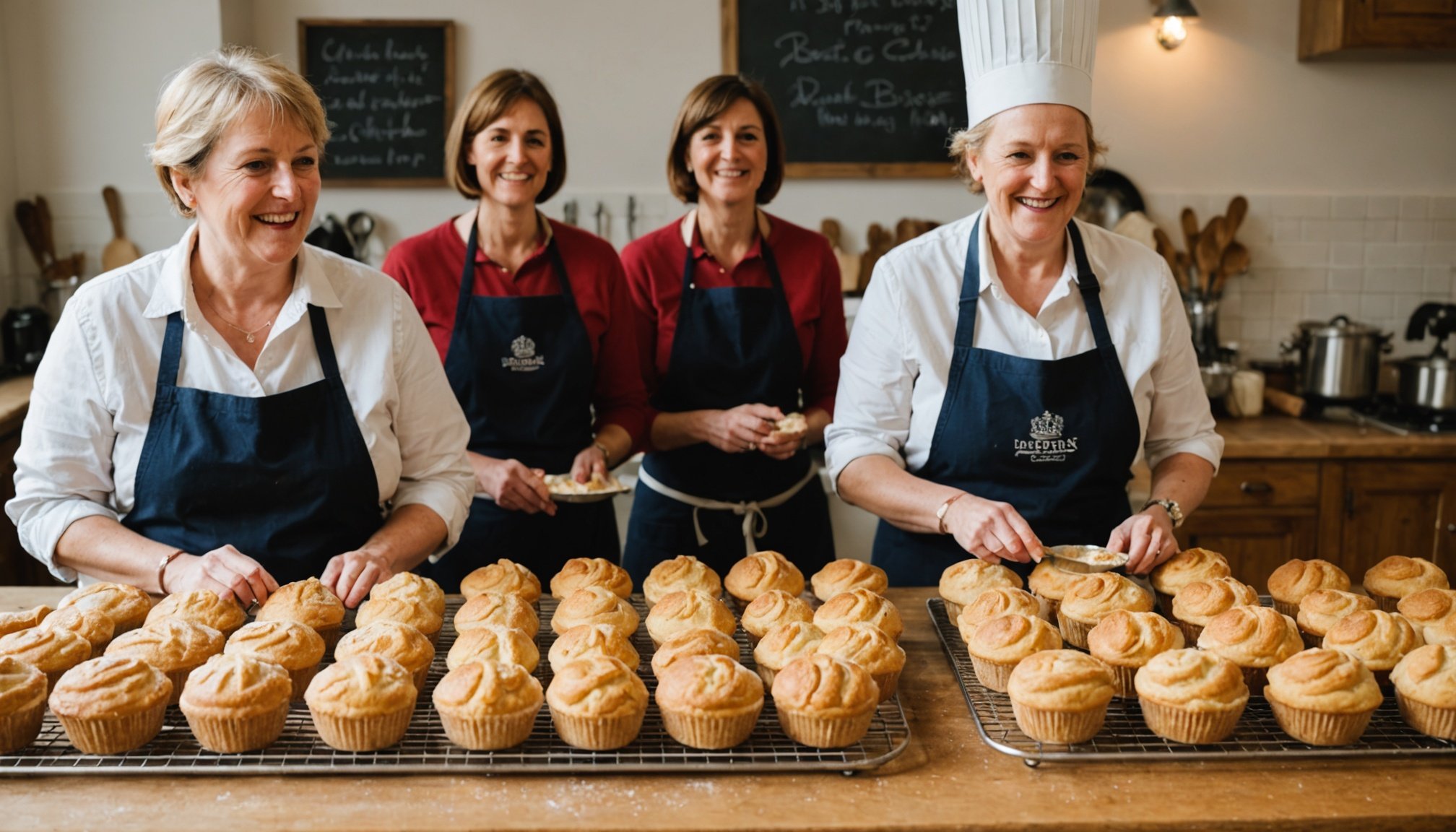Overview of Authentic British Baking Classes
Authentic British baking classes provide an immersive culinary experience where enthusiasts can delve into the heart of traditional British pastries and bread. These classes are cherished for offering some of the best baking experiences, imparting not only recipes but also the rich history and traditions behind classic British bakes. For those wondering where to learn baking in a genuine setting, these classes are the perfect opportunity.
The Types of Classes Available
Diverse in nature, these classes cater to various interests and skill levels. Beginner workshops might focus on simple scones and shortbread, while advanced sessions delve into crafting intricate treats like Bakewell tarts or Eccles cakes. Enthusiasts might also find courses dedicated to festive bakes, such as Christmas puddings or hot cross buns.
Also to discover : Discover the Best Spots to Join an Authentic English Baking Class!
Choosing the Right Venue
Selecting reputable venues is crucial to ensure an enriching and authentic experience. Esteemed cooking schools and workshops often employ seasoned chefs with a deep understanding of British baking. This guarantees that participants receive thorough instruction and valuable insights into the art of baking.
In conclusion, joining authentic British baking classes offers both a delightful escape and a chance to master beloved recipes, making them ideal for novices and seasoned bakers alike.
Have you seen this : Explore Liverpool”s Maritime Heritage: Join an Engaging Guided Tour Today!
Top Rated In-Person British Baking Classes
Exploring in-person baking classes offers a delectable journey into the art of pastry and bread-making. This curated list highlights some of the best local baking schools for those eager to hone their culinary skills through experiential learning.
Bakesmiths Academy in Bristol emerges as a favourite with its hands-on approach. Participants appreciate its small class sizes that allow for personal attention, fostering a rich learning environment. The warm ambience complements their well-structured courses, making it a haven for both novice and seasoned bakers.
Moving towards the capital, The Gentlemen Baristas School of Coffee and Baking in London stands out. While it uniquely combines brewing and baking, its workshops are lauded for their charm and expertise. User reviews frequently mention the knowledgeable instructors who bring brewing science and tangible baking skills to life.
Those seeking an immersive countryside experience should consider Ballymaloe Cookery School in Ireland. Though not amidst bustling city streets, this venue offers farm-fresh ingredients and a delightful rural setting. Reviewers often highlight their farm-to-table philosophy and impressive teacher-to-student ratio.
Embark on a flavourful adventure through these venues, where learning extends beyond recipes to embracing an authentic baking experience.
Best Online British Baking Classes
Online baking classes have transformed traditional learning into a digital experience, making virtual baking workshops accessible to budding bakers and seasoned pastry chefs alike. They offer the flexibility of remote learning— a perfect solution for learning from the comfort of your home.
Overview of Online Learning Platforms
Numerous platforms provide a diverse range of online baking classes. Websites like MasterClass and Skillshare host expert instructors catering to varying skill levels. Some platforms specialise in bread-making while others focus on patisserie. Before enrolling, ensure the platform you choose fits your needs and offers interactive features for enhanced learning.
Notable Instructors and Their Styles
Navigating these virtual baking workshops can lead you to renowned instructors. Mary Berry, known for her traditional approach, offers tutorials for classic recipes. Alternatively, Paul Hollywood focuses on artisanal bread-making techniques. These instructors bring their unique styles and expertise, making each class a distinct experience.
Benefits of Choosing Online Classes
Enrolling in remote learning classes allows flexibility in managing your schedule while mastering new skills. These classes are tailored to accommodate different skill levels, allowing beginners and advanced bakers to progress at their own pace. Online courses often provide lifetime access to materials, enabling repeated practice until perfection is achieved.
Class Levels and Types Offered
When diving into the world of baking, it’s essential to understand the variety of class levels available. Often, baking classes cater to different skill levels, providing a pathway from beginner to advanced learning experiences.
Beginner classes are ideal for novices looking to grasp the fundamental techniques. These courses cover basic skills such as measuring ingredients, understanding recipes, and mastering simple baking tasks. They provide a solid foundation for anyone new to the kitchen.
As your confidence grows, intermediate classes offer more complex challenges, focusing on honing your skills with slightly intricate recipes. Techniques like kneading, folding, and precise baking temperatures come into play here. Intermediate learners should feel encouraged to experiment and build on their beginner knowledge.
Those aiming for mastery can enroll in advanced classes. Here, students tackle delicate and sophisticated creations, pushing their skills to professional levels. Advanced lessons often include perfecting techniques for high-quality desserts and nearly flawless execution.
For those with specific interests, specialized baking classes are a valuable option. These cater to niche interests like desserts and pastries, focusing intently on creating specific items like artisan bread or gourmet cakes.
This tiered approach allows enthusiasts to progress systematically, improving through structured learning.
User Testimonials and Reviews
Understanding baking class reviews is crucial when considering which class to join. Feedback from past participants offers insight into their customer experiences, providing a realistic look at what one can expect. Testimonials often highlight not only the skills learned but also the enjoyment and satisfaction derived from the class.
In many reviews, people express how engaging and informative they found the instructors, often featuring high class ratings which significantly enhance the class’s credibility. For instance, a participant might mention how they became confident in baking a perfect loaf, reflecting the effectiveness of the teaching methods.
The impact of such feedback cannot be underestimated; glowing testimonials bolster a class’s reputation, encouraging new students to enrol. Furthermore, detailed reviews help potential participants assess whether the class meets their expectations and learning style, ultimately influencing their decision.
User satisfaction is paramount; it underscores the quality of the entire experience. When participants leave positive reviews, it indicates that the class not only met but often exceeded their expectations. This satisfaction is conveyed through the enthusiasm in their testimonials, offering a compelling reason for others to join and enhance their baking prowess.
Tips for Beginners in British Baking
Embarking on a journey into the world of British baking can be both exciting and daunting. To make this experience smoother, understanding some fundamental baking tips for beginners can be invaluable. Starting with the right beginner baker essentials, you’ll need a few key tools and ingredients. An accurate kitchen scale, a reliable whisk, and mixing bowls are indispensable. Stock your pantry with staples like flour, sugar, baking powder, and a variety of spices.
As you commence, it’s crucial to be aware of common mistakes. For instance, overmixing batter can lead to dense cakes, while inaccuracies in ingredient measurement can yield inconsistent results. Always read recipes thoroughly before starting, and double-check your oven temperatures to avoid mishaps.
For honing fundamental skills, try simple starting recipes that focus on enhancing technique. Classic British scones or a basic Victoria sponge cake are excellent choices. These recipes provide straightforward steps while allowing room for practising precision and attention to detail.
Being methodical and patient in your baking endeavours will build a solid foundation. With each bake, you’ll further develop your skills, gradually progressing to more complex creations.
Insights on Local Ingredients
Exploring the richness of British ingredients is foundational to understanding the uniqueness of traditional baking practices. British baking hinges on key ingredients such as flour, butter, sugar, and eggs. However, the sourcing of these ingredients can significantly impact the flavour and quality of baked goods.
Using local produce ensures that the ingredients aren’t just fresh, but also retain the distinct characteristics of the region. For example, the rich, creamy butter from Devon enhances the texture of scones, while the fine flour from Suffolk lends a soft and airy quality to cakes. By focusing on sourcing local produce, bakers contribute to the sustainability of local agriculture and help preserve the heritage of regional specialties.
Such culinary traditions influence baking practices across Britain. For instance, Scottish shortbread exemplifies how regional ingredients shape beloved recipes. With its iconic crumbly texture, it highlights the harmonious blend of local butter and flour. Meanwhile, Cornish pasties showcase the freshness of seasonal vegetables and meats native to Cornwall.
Regional specialties not only offer a taste of history but also encourage bakers to innovate within the framework of tradition, creating a dynamic evolution in classic British baking.
Historical Context of British Baking
The history of British baking is a tapestry of evolving tastes and techniques stretching back centuries. Its roots lie in Anglo-Saxon times when early bakers created basic breads. As trade expanded, exotic spices and sugar arrived, greatly influencing the development of traditional recipes. By the Victorian era, afternoon tea and the invention of the sandwich became cultural staples, enhancing baking’s cultural importance.
A key figure in this transformation was Mrs. Beeton, whose influential cookbook offered detailed traditional recipes that set the standard for home cooking. Likewise, Elizabeth David revolutionized post-war British baking with continental techniques, integrating them into the everyday British kitchen. These contributions highlight the symbiotic relationship between historical figures and the nation’s baking evolution.
Baking is more than just a culinary activity; it holds profound cultural significance in British society. It has always symbolized warmth and hospitality, with each region boasting unique specialties that define local identities. Events like seasonal festivals emphasize cultural baking significance, celebrating baked goods that have become synonymous with holidays and traditions. Thus, British baking remains a cherished and enduring aspect of national heritage, illustrating how gastronomical practices can deeply weave into the social and cultural fabric of a country.
Comparing Class Formats: In-Person vs. Virtual
When choosing between in-person and virtual baking classes, understanding the benefits and challenges of each can help you make an informed decision.
In-person classes often provide an immersive environment that can enhance the learning experience. One advantage is the hands-on guidance from instructors, allowing you to immediately resolve any doubts or mistakes. Furthermore, the tangible aspect of working within a live kitchen fosters a collaborative atmosphere. However, the downside includes travel time and potentially limited scheduling options.
Conversely, virtual baking experiences offer flexibility and comfort since you can attend from your own kitchen. This can make it easier to fit a class into a busy schedule. The challenges include the need for reliable technology and an internet connection. Moreover, without a physical presence, it might be harder to receive immediate feedback.
Personal learning styles play a crucial role in deciding which class format suits you best. If you prefer tactile learning and benefit from direct interaction, in-person classes might be ideal. On the other hand, if you are self-disciplined and enjoy learning at your own pace, online classes could offer a more favourable experience.











